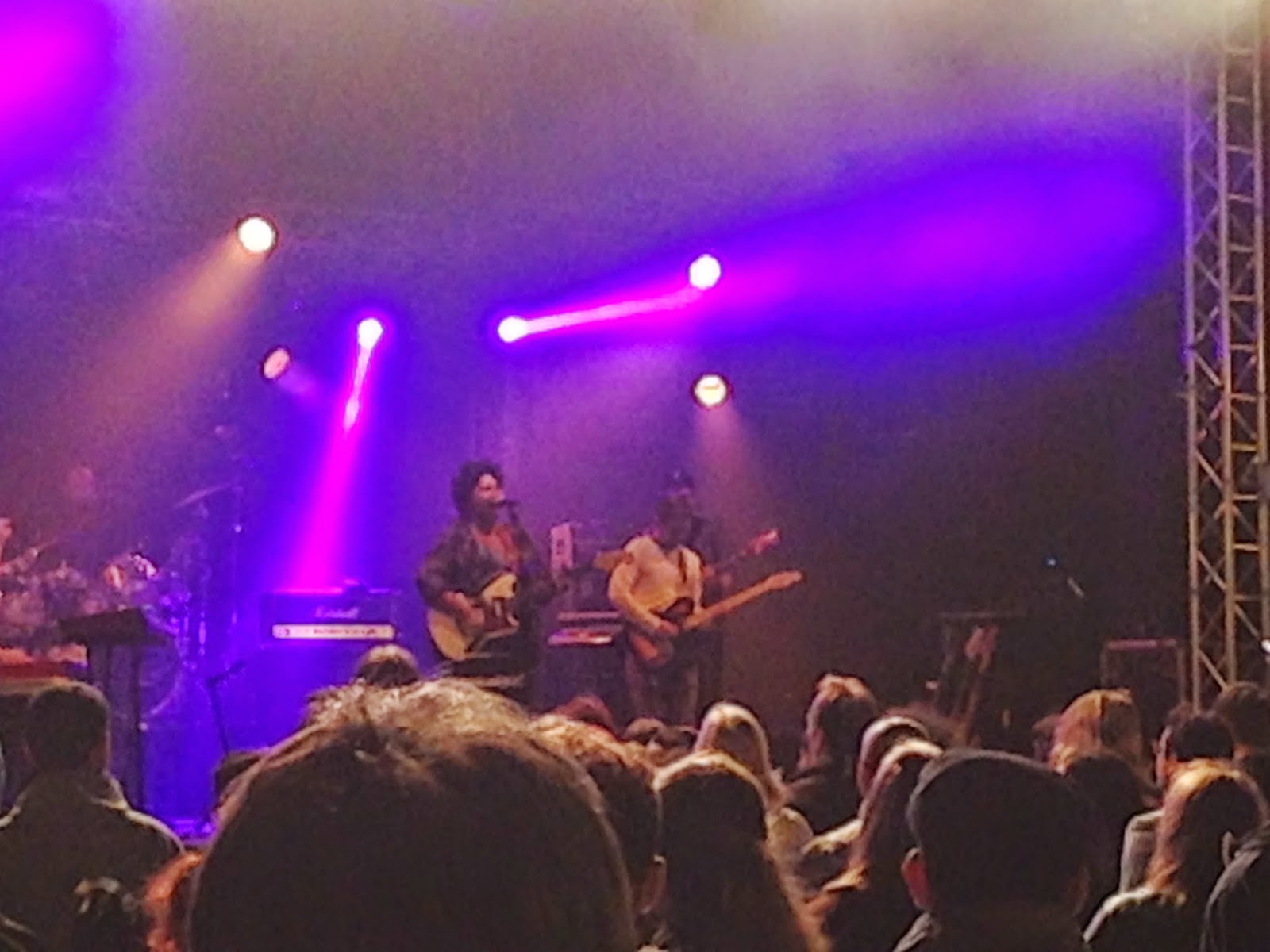After passing by –
or rather, pushing through – what must have been hundreds of people, I saw a
smaller stage with bright lights, pulsing music, and a commanding lead singer. Rina
Mushonga was in the middle of her set for Uitmarkt, the annual opening event of
the new cultural season for the inhabitants of Amsterdam. Although her audience
was a fraction of the size of the neighboring audience forming around the main
stage act, Mushonga was holding her own. She was playing her guitar wildly and
singing enthusiastically, encouraging us to clap along.
I first heard of Rina
Mushonga when I read the program for Uitmarkt earlier that day. The program
mentioned that her music is “…a fascinating collage of indie, pop, folk, and
prog-rock”. This description intrigued me. As a lover of R&B and acoustic music
myself, I felt that her incorporation of diverse musical traditions in a
contemporary way would be pleasant for my ears. For some reason, when reading
the description, I imagined a more intimate set featuring Rina Mushonga alone
with her guitar – nothing else. However, her set incorporated all the customary
elements of a rock concert. She employed the help of a keyboardist, background
singer, bass player, and drummer. There were lights, speakers, the works. After
watching for a couple of minutes, I couldn’t help but notice that the entire
band was white – except for the lead singer. Rina Mushonga was a black woman
with short afro hair while the rest of the band was white and had either blond
or brown hair. I knew the music was powerful if it could bring these people,
who seemed so different on the surface, to come together.
If I had to
describe Mushonga’s music in my own words, it would be “reggae rock.” Her
keyboardist and bass player held the foundation of the melody with a smooth
“grooviness” that must have been inspired by Bob Marley himself. However, the
music also had an intense quality to it. The lead singer, Mushonga herself, was
very emotive and loud with her voice, creating a beautiful, strong tone that
blended wonderfully with the music. Her percussionist brought intensity to the
pieces of music as well. These two
types of music – reggae and rock – bring together two different types of people
from varying backgrounds and musical tastes. By blending such opposing yet complementary
musical styles, Mushonga’s music crosses over cultural and identity boundaries.
I saw her perform
a fast upbeat song first. Although she was screaming to her fans in Dutch, the song
lyrics were in English. (At some points, it sounded like Dutch because of her
accent). Like any other musician performing live, she was playing with all the
energy and passion she could muster. She yelled to the audience often,
encouraging us to jump, clap, whatever we felt like. She would tilt her guitar
upward while playing and interact with her keyboardist and drummer. Overall,
her body as a performance tool was very effective. She brought the other
musicians together with her energy and kept the audience entertained
throughout.
But what kept me
engaged for most – if not all of – the performance was her commanding, intense
voice. Her vocal tone was both strident and warm. The best way for me to describe
her voice would be the opening verse of “The Lion King” in which the female
vocalist opens the film with the iconic melody that is replicated time and time
again in their Broadway rendition. Both of these vocalists – Mushonga and “The Lion King” singer
– produce a bellowing, ground-shaking sound that stirs you in your very soul. Her voice was especially prominent in
the next song, which started out as a slow pop ballad. She paused her guitar
playing to focus fully on her vocal performance. While looking upward, she
closed her eyes, implying that she was summoning an inner strength within in
order to emote the sound she needed. The first half of the song continued with her
vocals in the foreground and the instrumentals less prominent. After the
halfway point, however, the song changed to the same upbeat mix of prominent
instrumental and vocal aspects. There was also a bit of call and response too –
another popular technique to keep the audience engaged.
When this song was
finished I assumed there would be at least one more; but to my dismay the set
was already finished. Although Mushonga was only slotted for thirty minutes,
she managed to make use of her time very well. Even though I couldn’t understand the Dutch she used in
between songs, she struck me as a very courageous, empowered artist. She would
often punch her fists in the air while saying words that sounded powerful and
uplifting. She defies traditional thoughts about beauty through the way she
presented herself. Instead of straightening her hair like many black/African
artists, she chose to keep her hair’s original Afro texture. Also, her
curvaceous figure shuns the idea that artists must possess a certain body type if
they want to be successful. Even though I had never heard of Mushonga until
this night, her successful tours all over the world from Zimbabwe to Australia
illustrates her acceptance.
Overall, I enjoyed
her performance immensely; however, I felt I would enjoy her work more in an intimate
setting – with just her voice and guitar – since it was her voice that I found
particularly powerful. I felt that the instrumentalists around her were
talented but ended up obscuring the musical aspect that I found most
compelling. However, for an outdoor festival with a competing Dutch sensation
next door, she definitely held her own and delivered a fantastic performance.


No comments:
Post a Comment